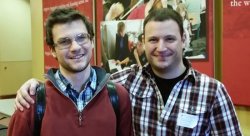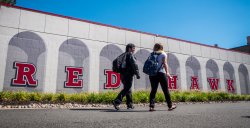Physics students and faculty present results at APS Meeting
Members of Montclair’s gravitational-wave research group discussed their results at the April 2015 meeting of the American Physical Society in Baltimore.
Posted in: Physics, Science and Technology, Students

The annual meeting focuses on the fields of gravitational physics, astrophysics, and nuclear and particle physics. Along with physics professor Marc Favata, undergraduate Blake Moore and graduate student Goran Dojcinoski gave oral presentations on their work related to black holes and gravitational waves.
This meeting focused on celebrating the 100th anniversary of Einstein’s publication of his Theory of General Relativity. Along with talks by Nobel Prize winners, NASA astronauts, and top scientists from different fields, the April meeting featured several talks on the history of general relativity, a banquet sponsored by the Topical Group on Gravitation (GGR), and exhibits related to black holes.
The research presented by the Montclair State physics faculty and students concerns the modeling of gravitational waves produced by orbiting compact objects like black holes or neutron stars. These models can be used by experimental efforts to detect gravitational waves, like the LIGO project (of which Montclair State is a member).
Blake Moore’s talk on “Secular gravitational-wave phasing to 3PN order for low-eccentricity inspiraling binaries” discussed an improved analytic model to describe the signal produced by two compact stars in a mildly elliptical orbit.
Goran Dojcinoski discussed his master’s thesis work on the “Nonlinear gravitational-wave memory from merging binary black holes.” This concerns an interesting effect of general relativity whereby gravitational waves themselves produce more gravitational waves. Goran’s work focused on computing this effect during the collision of two non-spinning black holes. Marc Favata gave a related talk (“Spin effects in the nonlinear gravitational-wave memory from inspiralling binaries”) focusing on how this phenomenon is altered by spinning black holes.
The annual APS meetings are among the highest profile gatherings of the US physics community. They are regularly attended by scientists and journalists from around the world. In addition to providing a venue to disseminate research results and insights, these meetings provide a valuable opportunity for young scientists to network and learn about the scientific process.
